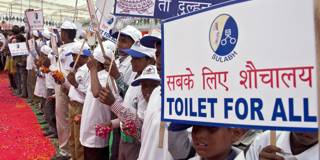Indian Prime Minister Narendra Modi and the Gates Foundation have both made access to toilets a central development concern. Rightly so: poor sanitation is a major development issue, and 2.5 billion people do not have access to basic, safe sanitation, with women and children suffering the most.
COPENHAGEN – Politicians and philanthropists often talk about abstract, lofty ideas such as sustainability and transformation through dialogue. So Bill Gates and Indian Prime Minister Narendra Modi should be applauded for tackling a more mundane, but crucial, subject: toilets.
The Bill & Melinda Gates Foundation wants to transform toilet technology itself, so that toilets aren’t dependent on major infrastructure, such as sewage systems and water-treatment plants. In 2011, the Gates Foundation launched its Reinvent the Toilet Challenge, which provides grants for researchers “who are using innovative approaches – based on fundamental engineering processes – for the safe and sustainable management of human waste.” The hope is that twenty-first-century toilets will convert human waste into energy, fertilizer, or even drinkable water.
For his part, Modi has declared building toilets more important than building temples, and he has launched a campaign to end open defecation in India by 2019, to coincide with the 150th anniversary of Indian independence leader Mahatma Gandhi’s birth. Toward that end, the Modi government is rapidly building basic sanitation facilities and installing millions of toilets around the country, including at least one in every school.

COPENHAGEN – Politicians and philanthropists often talk about abstract, lofty ideas such as sustainability and transformation through dialogue. So Bill Gates and Indian Prime Minister Narendra Modi should be applauded for tackling a more mundane, but crucial, subject: toilets.
The Bill & Melinda Gates Foundation wants to transform toilet technology itself, so that toilets aren’t dependent on major infrastructure, such as sewage systems and water-treatment plants. In 2011, the Gates Foundation launched its Reinvent the Toilet Challenge, which provides grants for researchers “who are using innovative approaches – based on fundamental engineering processes – for the safe and sustainable management of human waste.” The hope is that twenty-first-century toilets will convert human waste into energy, fertilizer, or even drinkable water.
For his part, Modi has declared building toilets more important than building temples, and he has launched a campaign to end open defecation in India by 2019, to coincide with the 150th anniversary of Indian independence leader Mahatma Gandhi’s birth. Toward that end, the Modi government is rapidly building basic sanitation facilities and installing millions of toilets around the country, including at least one in every school.